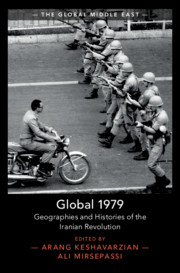Book contents
- Global 1979
- The Global Middle East
- Global 1979
- Copyright page
- Dedication
- Contents
- Figures
- Tables
- Contributors
- Acknowledgments
- Maps
- Orientations
- Introduction
- 1 A Quiet Revolution:
- 2 Globalizing the Iranian Revolution:
- Part I Global Shadows
- Part II Militarized Cartographies
- Part III Hidden Genealogies
- Part IV Circulating Knowledge
- Part V Aspirational Universalisms
- Select Bibliography
- Index
2 - Globalizing the Iranian Revolution:
A Multiscalar History
from Orientations
Published online by Cambridge University Press: 01 July 2021
- Global 1979
- The Global Middle East
- Global 1979
- Copyright page
- Dedication
- Contents
- Figures
- Tables
- Contributors
- Acknowledgments
- Maps
- Orientations
- Introduction
- 1 A Quiet Revolution:
- 2 Globalizing the Iranian Revolution:
- Part I Global Shadows
- Part II Militarized Cartographies
- Part III Hidden Genealogies
- Part IV Circulating Knowledge
- Part V Aspirational Universalisms
- Select Bibliography
- Index
Summary
This chapter discusses how the volume charts the 1979 Iranian Revolution by examining the complex interplay of space and time that made the revolution possible and conceptions of the global contested. What unites the multidisciplinary collection of authors is that they all treat the global, national, regional, or local as neither natural, preexisting, nor opposed to one another; instead, they assume that these scales are coproduced in specific historical contexts. Globalizing the Iranian Revolution in this manner is an enterprise in recovering the histories of the revolution non-teleologically and to think of global history as multidirectional and not emanating from a single epicenter or from “the global” to “the local.” Specifically, Global 1979 presents five discrete propositions: (1) geographic and archival margins are powerful means to decenter political struggles; (2) global guerrilla tactics politicized space before and after the revolution; (3) tracing genealogies allows us to think simultaneously, rather than linearly about causation; (4) the circulation of expertise left divisive imprints on society; (5) part of what gave the revolution meaning was imagining the world. Collectively and individually, the chapters disrupt familiar stories and interrupt hackneyed historical sequences by making us attuned to configurations of space and time obfuscated by a penchant to explain outcomes, assign responsibility, and second-guess decisions.
Keywords
- Type
- Chapter
- Information
- Global 1979Geographies and Histories of the Iranian Revolution, pp. 36 - 56Publisher: Cambridge University PressPrint publication year: 2021
- 4
- Cited by

